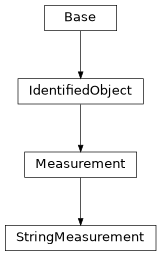cimpy.cgmes_v2_4_15.StringMeasurement module
- class cimpy.cgmes_v2_4_15.StringMeasurement.StringMeasurement(StringMeasurementValues='list', *args, **kw_args)[source]
StringMeasurement represents a measurement with values of type string.
- StringMeasurementValues:
The values connected to this measurement. Default: “list”
Documentation of parent class Measurement:
A Measurement represents any measured, calculated or non-measured non-calculated quantity. Any piece of equipment may contain Measurements, e.g. a substation may have temperature measurements and door open indications, a transformer may have oil temperature and tank pressure measurements, a bay may contain a number of power flow measurements and a Breaker may contain a switch status measurement. The PSR - Measurement association is intended to capture this use of Measurement and is included in the naming hierarchy based on EquipmentContainer. The naming hierarchy typically has Measurements as leafs, e.g. Substation-VoltageLevel-Bay-Switch-Measurement. Some Measurements represent quantities related to a particular sensor location in the network, e.g. a voltage transformer (PT) at a busbar or a current transformer (CT) at the bar between a breaker and an isolator. The sensing position is not captured in the PSR - Measurement association. Instead it is captured by the Measurement - Terminal association that is used to define the sensing location in the network topology. The location is defined by the connection of the Terminal to ConductingEquipment. If both a Terminal and PSR are associated, and the PSR is of type ConductingEquipment, the associated Terminal should belong to that ConductingEquipment instance. When the sensor location is needed both Measurement-PSR and Measurement-Terminal are used. The Measurement-Terminal association is never used alone.
- PowerSystemResource:
The measurements associated with this power system resource. Default: None
- Terminal:
One or more measurements may be associated with a terminal in the network. Default: None
- measurementType:
Specifies the type of measurement. For example, this specifies if the measurement represents an indoor temperature, outdoor temperature, bus voltage, line flow, etc. Default: ‘’
- phases:
Indicates to which phases the measurement applies and avoids the need to use measurementType to also encode phase information (which would explode the types). The phase information in Measurement, along with measurementType and phases uniquely defines a Measurement for a device, based on normal network phase. Their meaning will not change when the computed energizing phasing is changed due to jumpers or other reasons. If the attribute is missing three phases (ABC) shall be assumed. Default: None
- unitMultiplier:
The unit multiplier of the measured quantity. Default: None
- unitSymbol:
The unit of measure of the measured quantity. Default: None
Documentation of parent class IdentifiedObject:
This is a root class to provide common identification for all classes needing identification and naming attributes.
- DiagramObjects:
The domain object to which this diagram object is associated. Default: “list”
- description:
The description is a free human readable text describing or naming the object. It may be non unique and may not correlate to a naming hierarchy. Default: ‘’
- energyIdentCodeEic:
The attribute is used for an exchange of the EIC code (Energy identification Code). The length of the string is 16 characters as defined by the EIC code. References: Default: ‘’
- mRID:
Master resource identifier issued by a model authority. The mRID is globally unique within an exchange context. Global uniqueness is easily achieved by using a UUID, as specified in RFC 4122, for the mRID. The use of UUID is strongly recommended. For CIMXML data files in RDF syntax conforming to IEC 61970-552 Edition 1, the mRID is mapped to rdf:ID or rdf:about attributes that identify CIM object elements. Default: ‘’
- name:
The name is any free human readable and possibly non unique text naming the object. Default: ‘’
- shortName:
The attribute is used for an exchange of a human readable short name with length of the string 12 characters maximum. Default: ‘’
Inheritance Diagram:
